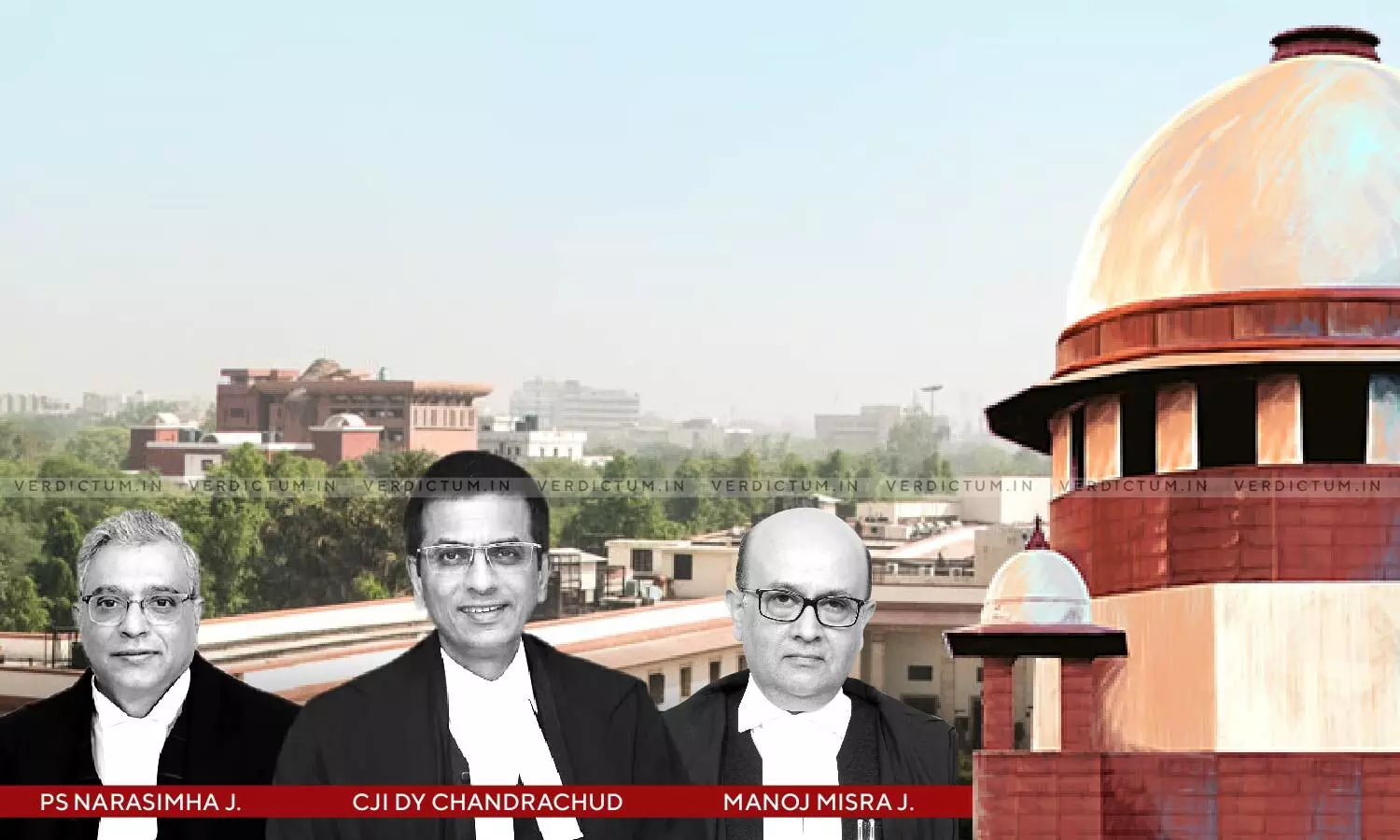
HC Chief Justices Shall Register Suo-Motu Case For Swift Disposal Of Criminal Cases Against MPs/MLAs: Supreme Court Issues Guidelines
 |
|The Supreme Court formulated guidelines to expedite case disposal against elected members of Parliament and Legislative Assemblies.
The court directed that the Chief Justices of High Courts should register a suo-motu case titled "In Re: designated courts for MPs/MLAs" to monitor the early disposal of criminal cases against elected representatives.
A three judge Bench of CJI DY Chandrachud, Justice PS Narasimha and Justice Manoj Misra some directions in an order passed in a petition filed by Ashwini Kumar Upadhyay. The petitioner sought two reliefs: expeditious disposal of criminal cases against elected members of Parliament and Legislative Assemblies and the constitutional validity of Section 8 of the Representation of Peoples Act, 1951.
The Court noted that initially there was a proposal for setting up twelve special courts. However, the court reconsidered and suggested a specified court in each district for prioritized hearings. Information was sought from High Courts about the status of cases against MPs and MLAs.
The Supreme Court examined a comprehensive protocol prepared by the Amicus Curiae, including the number of pending cases in each state. The Court found, “there are as many as 5,175 subject cases pending as of November, 2022. Of these, cases that are pending for more than 5 years are as many as 2,116, which figure is more than 40% of such pendencies. This is a large number.”
The Court added, “These cases have a direct bearing on our political democracy. Hence, there is a compelling need to make every effort to ensure that these cases are taken up on priority and decided expeditiously. Confidence and trust of the constituency in their political representative, be it an MP or an MLA, is necessary for an interactive, efficient and effective functioning of a parliamentary democracy. However, such confidence is difficult to expect when figures, as indicated in the above referred table, loom large in our polity”
The Court formulated guidelines for expeditious case disposal, including the registration of suo-motu cases by Chief Justices, prioritization of cases based on severity, and the use of technology for efficient proceedings.
- Learned Chief Justices of the High Courts shall register a suo-motu case with the title, “In Re: designated courts for MPs/MLAs” to monitor early disposal of criminal cases pending against the members of Parliament and Legislative Assemblies. The suo-motu case may be heard by the Special Bench presided by the Learned Chief Justice or a bench assigned by them.
- The Special Bench hearing the suo-motu case may list the matter at 8 Though Constitution uses the expression ‘subordinate’ to describe the district judiciary, it is not to be understood in the literal sense. In fact, this Court in All India Judges Association v. Union of India & Ors., 2023 SCC OnLine SC 673, has held that district judiciary is a part of our basic structure. Page 14 of 15 regular intervals as is felt necessary. The High Court may issue such orders and/or directions as are necessary for expeditious and effective disposal of the subject cases. The Special Bench may consider calling upon the Advocate General or the Public Prosecutor to assist the Court.
- The High Court may require the Principal District and Sessions Judge to bear the responsibility of allocating the subject cases to such court or courts as is considered appropriate and effective. The High Court may call upon the Principal District and Sessions Judge to send reports at such intervals as it considers expedient.
- The designated courts shall give priority: (i) first to criminal cases against MP’s & MLA’s punishable with death or life imprisonment then to (ii) cases punishable with imprisonment for 5 years or more, and then hear (iii) other cases. The Trial Courts shall not adjourn the cases except for rare and compelling reasons.
- The learned Chief Justices may list cases in which orders of stay of trial have been passed before the Special Bench to ensure that appropriate orders, including vacation of stay orders are passed to ensure commencement and conclusion of trial.
- The Principal District and Sessions Judge shall ensure sufficient infrastructure facility for the designated courts and also enable it to adopt such technology as is expedient for effective and efficient functioning.
- The High Courts shall create an independent tab on their website providing district-wise information about the details of the year of Page 15 of 15 filing, number of subject cases pending and stage of proceedings. We make it clear that while monitoring the subject cases, the Special Bench may pass such orders or give such additional directions as are necessary for early disposal of the subject cases.
The Court disposed of the Writ Petition related to the expeditious disposal of criminal cases against elected representatives. The matter regarding the constitutional validity of Section 8 of the Representation of Peoples Act, 1951, was listed for a future hearing.
Cause Title: Ashwini Kumar Upadhyay v. Union Of India & Anr., [2023 INSC 991]
Click here to read/download Judgment